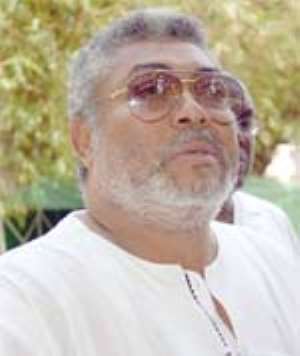
Kofi Akosah-Sarpong argues that a shadow floats over Jerry Rawlings' life – and recent Ghanaian history as well. That dark presence affects more than just Rawlings private life.
Former Ghanaian President John Jerry Rawlings statement carried by “Accra Daily Mail” (April 05, 2007) that “You think you can get power from the NPP like that? You go get it by force,” is viewed, by implications, by Ghanaian watchers as calls for coup detat, especially as the pro-ruling National Patriotic Party newspapers and commentators argue. Rawlings, by Ghanaian political history, is coup prone.
The implications of Rawlings call for military overthrow of the NPP is much deeper. It is, therefore, not totally a nasty delight in security and political circles that make Ghanaians wonder about the character of Jerry Rawlings. The interest goes deeper than that. Rawlings sometimes calls forth troublesome mysteries of Ghanaian politics and psychology. Rawlings is lightening rod with strange electricity, almost 15 years after vacating the presidency, still firing in the air around him – passions that are always not his responsibility but may emanate from psychic disturbances in Ghana itself. For various reasons, large segments of the Ghanaian elites do not have a healthy relationship with Jerry Rawlings.
As the nascent Ghanaian democracy grows, Rawlings is increasingly becoming a complicated man in the Ghanaian democratic settings – deep down, despite vacating the presidency after completing the two terms mandated by the Constitution, he does not belief in democracy as vehicle for development. The picture of him as two-time coup maker, violent, rough, hot-headed and sometimes incoherent, longing for military overthrow of the ruling NPP, making anti-democratic statements, heating the democratic process with clear seditious ranting, most times reflected in his characteristic “boom” speeches, and heckling the ruling NPP is one version. Rawlings has other versions – more interesting selves. Rawlings failure to attend the 50th anniversary of the birth of Ghana, for reasons as abysmal as the rough-and-tumble of the Ghanaian political scene, is one. From reasons ranging from the ruling NPP not doing well to some services cut off from him by the NPP for his alleged behaviour as a way of disciplining him, Rawlings is the centre of Ghanaian security definition. But Rawlings is a serious and remarkable figure.
Once, long ago, Rawlings was the Junior Jesus of Ghanaian politics: high spirited, youthful, saviour, can-do, fearless, heedless. Having ruled for almost 20 years, he never evolved, like Tanzania's Julius Nyerere, into the ideal matured democrat. Instead Rawlings did something that was in its way just impressive. He became one of the striking nation builders in post-colonial developing world, a military and civilian leader who cleaned the terrible rot scattered by elites who were alienated from Ghanaians' developmental needs and his mark upon the Ghanaian and African people has been prominent and permanent. Over the past 15 years, through his restlessness, the tabloid version of Jerry Rawlings does not do him justice. The Ghanaian public that knows Jerry Rawlings by his reckless “boom” speeches alone may vastly underrate him.
But Jerry Rawlings lives under the rule of a strange metaphysic. Rawlings had to fight on in the messy Ghanaian world after Kwame Nkrumah and J.B. Danquah floated away. Clearly power drunk, perhaps Rawlings life cracked after his protégé, Prof. John Atta-Mills, presidential candidate of the main opposition National Democratic Party (NDC), lost to the incumbent President John Kufour in the 2000 and 2004 presidential elections. The serious nation-builder in Rawlings would turn now and then into reckless and seditious statements, sometimes juvenile, the ex-president and serious nation-builder into an undemocratic, imperially threatening mess. The 60-year old, two-time military, two-time civilian ruler who ruled Ghana for almost 20 years would revert to immature, sloppy baby - “You think you can get power from the NPP like that? You go get it by force.”
The question is, Why? Was all this unhappy transformation the influence of Ghana metaphysics? Or was it simply democratic immaturity? In any case the shadow fell and Ghana has now and then, like fluctuating waves, hear from Rawlings' undemocratically threatening “boom” speeches that tell them where their 15-year-old democratic dispensation came from.




 This IMANI job no dey pap; the people you are fighting for are always fighting y...
This IMANI job no dey pap; the people you are fighting for are always fighting y...
 Prof. Naana Opoku-Agyemang has changed; you can see a certain sense of urgency –...
Prof. Naana Opoku-Agyemang has changed; you can see a certain sense of urgency –...
 MFWA Executive Director slams Akoma FM for engaging in ‘irresponsible’ media pra...
MFWA Executive Director slams Akoma FM for engaging in ‘irresponsible’ media pra...
 ‘Women must become millionaires too’ — Prof Jane Naana on establishment of Women...
‘Women must become millionaires too’ — Prof Jane Naana on establishment of Women...
 Some believe only in Ghanaian votes, not Ghana — Kofi Asare jabs politicians
Some believe only in Ghanaian votes, not Ghana — Kofi Asare jabs politicians
 Plan to make BEST sole aggregator of Sentuo Oil Refinery will create market chal...
Plan to make BEST sole aggregator of Sentuo Oil Refinery will create market chal...
 2024 elections: I can't have the man I removed from office as my successor — Aku...
2024 elections: I can't have the man I removed from office as my successor — Aku...
 2024 Elections: Immediate-past NPP Germany Branch Chairman garners massive votes...
2024 Elections: Immediate-past NPP Germany Branch Chairman garners massive votes...
 Gov’t focused on making Ghana energy self-sufficient, eco-friendly – Akufo-Addo
Gov’t focused on making Ghana energy self-sufficient, eco-friendly – Akufo-Addo
 April 25: Cedi sells at GHS13.74 to $1, GHS13.14 on BoG interbank
April 25: Cedi sells at GHS13.74 to $1, GHS13.14 on BoG interbank
